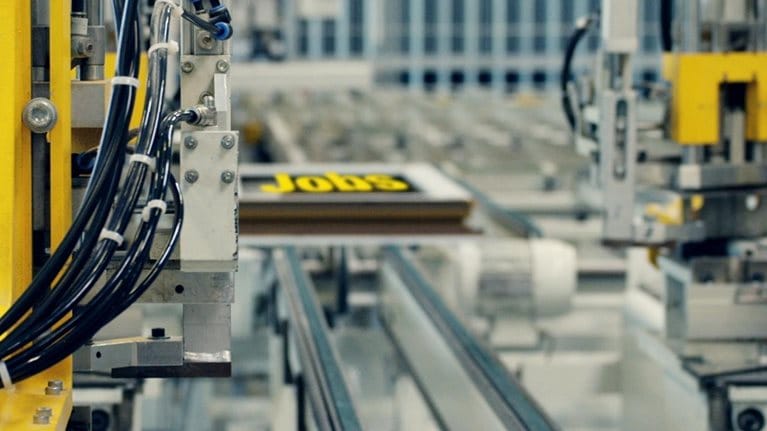Thomas L. Friedman: Lifting people back into the middle class
Other videos in this series include:
- Why simple fixes don’t work anymore
- An interview with Mother Nature
- Technology moves in steps
- The three climate changes
- Why Thomas L. Friedman is optimistic
Interview transcript
Thomas L. Friedman: What was basically happening as a result of the No Ordinary Disruption we’ve been through is that the foundation of the American middle class has completely shrunk almost to zero. What was the foundation of the American middle class? By the way, it’s also true for the European middle class and the Asian middle class. It was something called a high-wage, middle-skill job. High wages but middle skills.
My uncle, in the early 1960s, was a loan officer at the Farmers and Mechanics Bank in Minneapolis. And he only had a high school degree. Now, is there any loan officer, at any bank anywhere, that only has a high school degree today? No. He had middle skills, but he actually had a high-wage job. That was the foundation of the middle class.
Everything we need to be thinking about today, I believe, if you’re running for president, is how you want to return the high-wage job. It doesn’t have to be middle skilled. It’s going to actually require higher skills just by the nature of things. Basically what happened is that when the high-wage middle-skill job disappeared, we now have high-wage, high-skill jobs. We have low-wage, low-skill jobs. As your research has shown, those are growing. But how do we get more people into the high-wage, high-skill band of jobs? That, I think, is the central economic and political question for society, if you want to have a stable middle class.
James Manyika: I couldn’t agree more. And in fact, in some ways we’re already there. That problem already exists.
Thomas L. Friedman: Yes, it’s right in front of us.
James Manyika: Think about the conversations over the last five or so years about income inequality. Some of the work we’ve done highlights that income inequality is there, and it’s actually gotten worse. But the really striking thing is the wage stagnation that we’ve seen for decades. In fact, in some ways, arguably, it could be at the root of some of the angst and concerns that society has. Then you layer on top of that the trends we’re talking about, the impact of technology and so forth.
One of the things that we don’t worry about, at least not as much on this technology and jobs question, is this issue about “Will there be enough jobs?” All the scenarios and all the work we’ve done and other economists have done suggest there will be enough jobs, at least in the next couple of decades. Now, of course you should always worry about that because things could change and so forth.
But a few key things will absolutely be real challenges. One is this question about how occupations are going to shift. We know that as technology starts to automate some work and some activities, some occupations are going to decline. But others are going to rise. And, to your example about what’s happened to the middle class, many of the occupations that are going to decline have had middle-wage incomes at middle-wage skills. And those are going to decline. The ones that are growing, that will grow, don’t look like they will be high-income-earning jobs.
As that plays out between the jobs lost and the jobs gained, even though there will be enough work, then you worry about three big transitions. And I’m going to test these on you to see what you think, whether we are ready to deal with this. One is how we deal with the occupational shifts, people moving from one occupation to another, and often one place to another. That’s a big challenge. And the scale of that is quite substantial.
The second question surrounds what you might call skill shifts. In some cases, the skills needed are going to be much higher; in some cases they’re just different. So how do we, or how do people, navigate the skill shift, which is quite substantial?
Then the third one is the income wage question, which is, will be people be able to earn enough? And those are pretty big challenges, even in a world where there’s enough work.
Thomas L. Friedman: Well, what you described, the world you described, there’s one thing we know for sure: that your healthcare, your pension, and your learning—which has to be the newest entitlement program, basically, the ability to be a lifelong learner—all three of those have to become ubiquitous and mobile.
If I’m running for office, I start there. How do I make your pension, your healthcare affordable, and your learning mobile and easily accessible for your life? I think those are the three central questions for lifting people back into the middle class. That’s a broad economic answer. That’s at the national level.
At the local level, I think there’s a community answer. And that’s how communities come together and build what I call complex, adaptive coalitions, where business, labor, philanthropists, educators, social entrepreneurs, and local government all network together, to build a coalition to entice the companies, to inspire startups, to create those jobs. Today you need three people starting jobs for seven. You need eight people starting jobs for 30. You need two starting jobs, you know, for 20. That’s where we’re going to get those 25,000 jobs.
Watch the full interview, “Thomas L. Friedman and James Manyika: The world’s gone from flat, to fast, to deep.”


